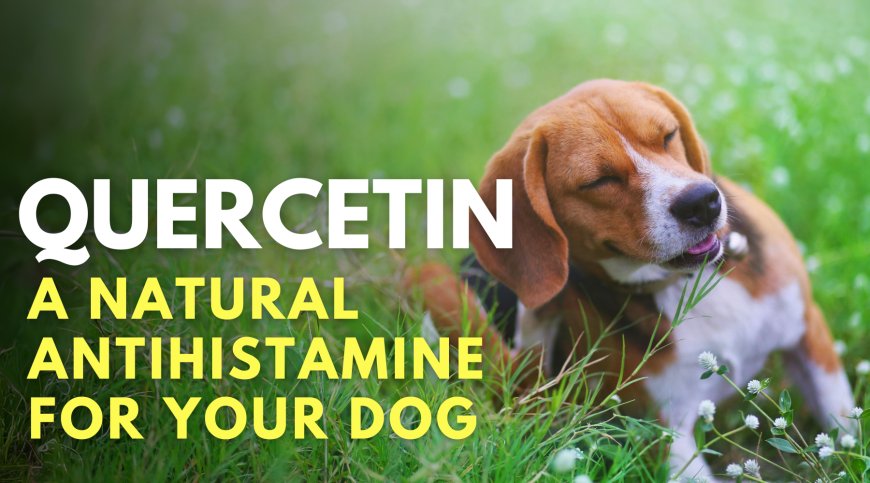Quercetin for Pets: A Safe and Effective Immune Booster and Anti-inflammatory for Dogs - Scientific Research Review
Quercetin, is a potent flavonoid found in fruits, vegetables, and grains. It is known for its health and therapeutic benefits that increase in potency and bioavailability by using a natural fermentation process. Studies confirm that quercetin is safe for dogs and that it also has anti-inflammatory, immune-modulating, and antioxidant properties. The flavonoid's in quercetin also provide anticancer and cardiovascular benefits.More

Quercetin, a naturally occurring flavonoid found in many fruits, vegetables, leaves, and grains, has attracted significant attention for its potential health benefits and therapeutic ability in both animal models and humans.
Dietary Sources and Bioavailability
Quercetin is in foods like berries and apples which are particularly rich sources.
However, its bioavailability is influenced by the form in which it's consumed, this is why we have chosen fermented quercetin in JointButter®. The fermentation process makes the active ingredients more potent.
How does quercetin work and is it safe for dogs?
A study by Moon, Wang, DiCenzo, & Morris (2008).[1] and Graefe, Derendorf, & Veit (1999).[2] has shown that quercetin's bioavailability in humans is relatively low, suggesting that dietary intake or supplementation needs careful consideration to achieve therapeutic effects.
Concerning safety, Harwood et al. (2007) provided a comprehensive review, arguing that quercetin is safe with no evidence of in vivo toxicity or carcinogenic properties.[3] at consumption levels achievable through diet or supplementation.
What are the Health Benefits of Quercetin?
Anti-inflammatory and Immune Function
Quercetin's anti-inflammatory and immunomodulatory effects are well-documented. Davis, Murphy, & Carmichael (2009)[4] and Konrad & Nieman (2015)[5] discussed its potential to enhance physical performance and reduce illness by modulating immune function. These benefits are particularly notable in the context of exercise-induced stress, suggesting quercetin's role in supporting recovery and also reducing susceptibility to respiratory infections.
Quercetin has Antioxidant Properties
The antioxidant properties of quercetin, as reviewed by Young et al (1999)[6], contributes to its protective effects against oxidative stress, potentially reducing the risk of chronic diseases, including cardiovascular diseases and cancer.
Anticancer Potential is Promising
Rauf et al. (2018).[7] and Niedzwiecki et al. (2016).[8] explored quercetin's anticancer efficacy, highlighting its ability to modulate various signaling pathways involved in cancer progression. The flavonoid's role in regulating the expression of genes related to cancer cell survival, growth, and metastasis underscores its potential as a complementary therapy in cancer treatment.
Cardiovascular Health
One study by Jia. (2019).[9] demonstrated quercetin's protective effects against atherosclerosis by influencing the markers related to lipid metabolism and cholesterol regulation. These findings suggest quercetin could be a beneficial dietary component in preventing cardiovascular diseases.
Is quercetin good for dogs and people?
Based on available research, quercetin is an attractive ingredient for advanced dietary supplements providing wide-ranging health benefits, including anti-inflammatory, immuno-modulatory, antioxidant, and anti-cancer properties.
References
- Moon, Y. J., Wang, L., DiCenzo, R., & Morris, M. E. (2008). Quercetin pharmacokinetics in humans. Clinical Trial Biopharm Drug Dispos, 29(4), 205-217. doi: 10.1002/bdd.605.
-
Graefe, E. U., Derendorf, H., & Veit, M. (1999). Pharmacokinetics and bioavailability of the flavonol quercetin.
-
Harwood, M., Danielewska-Nikiel, B., Borzelleca, J. F., Flamm, G. W., Williams, G. M., & Lines, T. C. (2007). A critical review of the data related to the safety of quercetin and lack of evidence of in vivo toxicity, including lack of genotoxic/carcinogenic properties. Food and Chemical Toxicology, 45(11), 2179-2205. doi:10.1016/j.fct.2007.05.015
-
Davis, J. M., Murphy, E. A., & Carmichael, M. D. (2009). Effects of the dietary flavonoid quercetin upon performance and health.
- Konrad, M., & Nieman, D. C. (Year). Evaluation of quercetin as a countermeasure to exercise-induced physiological stress. In Antioxidants in Sport Nutrition (Chapter 10). NIH NLM Logo.
-
Young, J. F., et al. (1999). Effect of fruit juice intake on urinary quercetin excretion and biomarkers of antioxidative status.
- Rauf, A., Imran, M., Khan, I. A., Rehman, M. U., Gilani, S. A., Mehmood, Z., & Mubarak, M. S. (2018). Anticancer potential of quercetin: A comprehensive review. Review Phytother Res, 32(11), 2109-2130. doi: 10.1002/ptr.6155.
- Niedzwiecki, A., Roomi, M. W., Kalinovsky, T., & Rath, M. (2016). Anticancer Efficacy of Polyphenols and Their Combinations. Nutrients, 8(9), 552. doi: 10.3390/nu8090552.
- Cao, H., Jia, Q., Shen, D., Yan, L., Chen, C., & Xing, S. (2019). Quercetin has a protective effect on atherosclerosis via enhancement of autophagy in ApoE−/− mice. Experimental and Therapeutic Medicine, 18(4), 2451–2458. doi: 10.3892/etm.2019.7851.











































